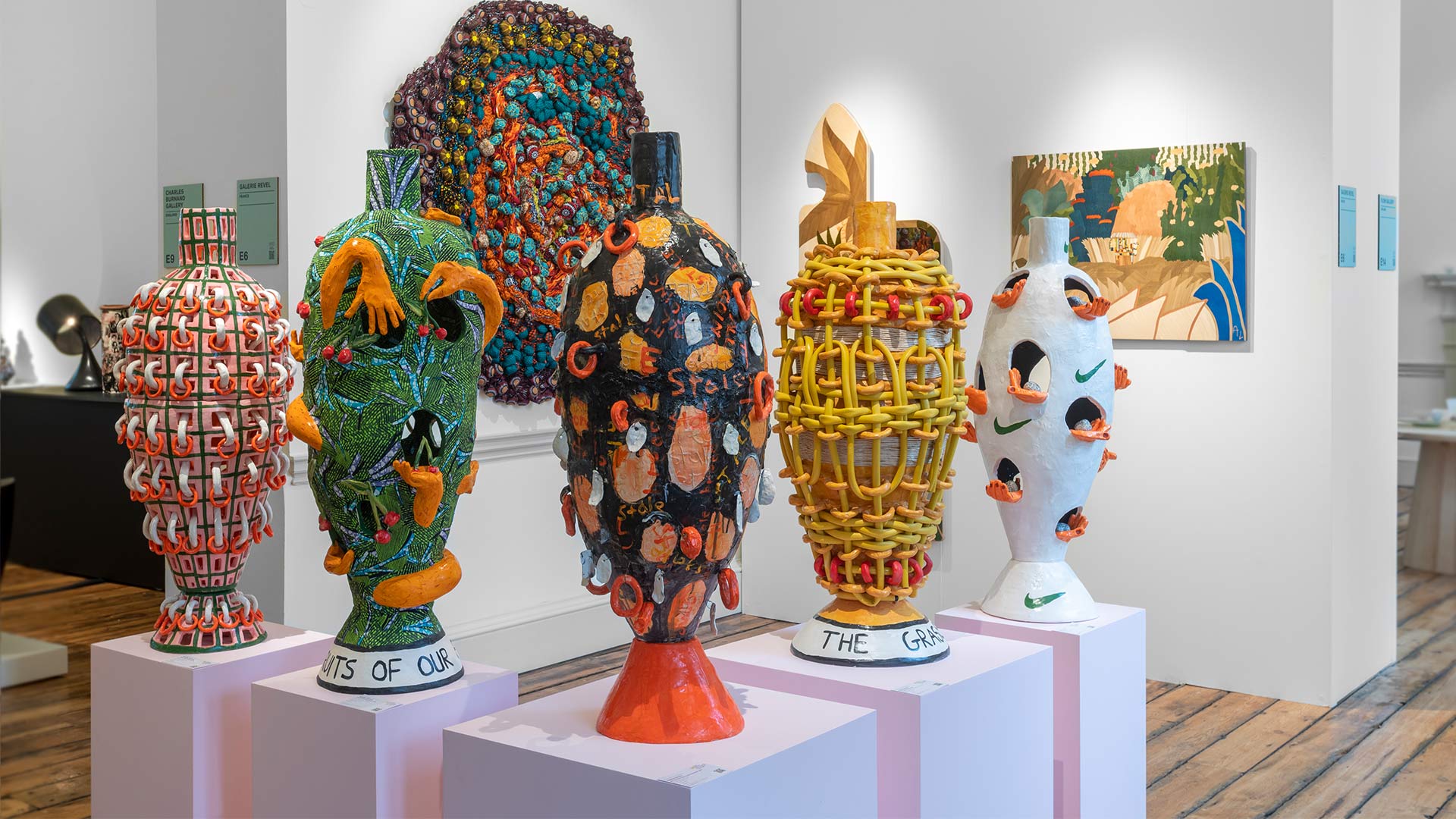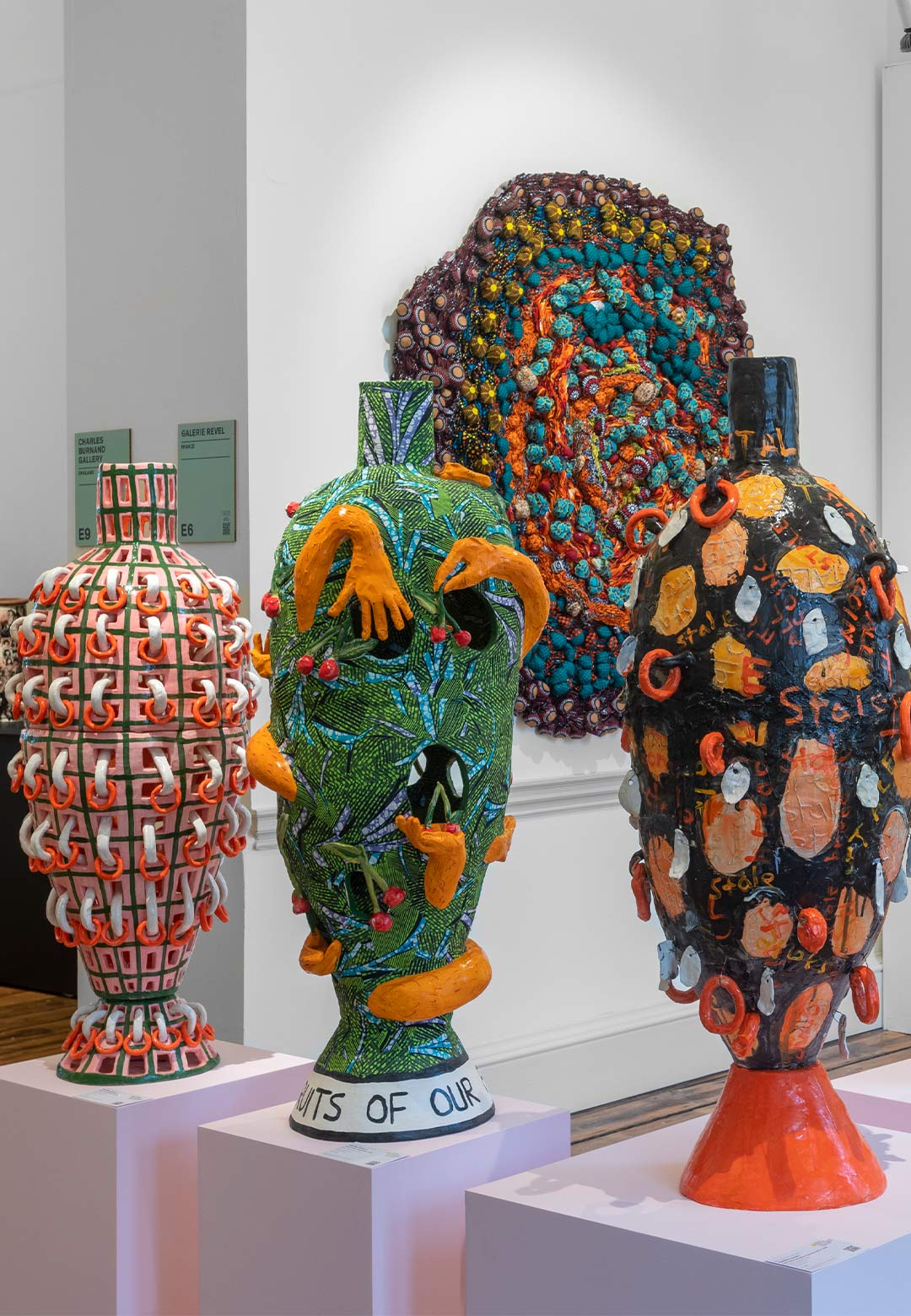Born and raised in Harare, Zimbabwe, Xanthe Somers (b. 1992) majored in printmaking, specialising in etching and screen prints during her Fine Art studies at Michaelis, UCT in Cape Town, South Africa. Now she is a self-taught ceramicist exploring memory discourse, inspired by the Zimbabwean postcolonial culture, drawing international attention for her displayed works at Collect Art Fair in London, presented by Galerie Revel.
Somers creates sizeable vessels that take on an allegorical meaning, revealing the political semantics of everyday objects. The looping shapes, bright colours and intricate craftsmanship develop a sense of play and a ‘happy’ aesthetic. While a closer inspection of the text on the works and the titles—such as Like Stale Bread After a Hard Day’s Work or Don’t Do It with the recognizable sports brand logo—immediately urge the viewer into analytical thought.
Incorporating traditional Zimbabwean crafts into her works, Somers uses pipe maize, golden lustre, fabric, and a hose pipe to create the loops, flowers and almost animated-looking accents of her dynamic sculptural designs. Grouped on a platform in the middle of the Galerie Revel booth at the Collect Fair, these vessel sculptures appear to interrogate “the colonial ghosts and systematic repressions still apparent in society,” as the artist explains it.
STIR interviews Somers, in an attempt to delve into her practice, creative process and the meaning behind it all.
Zeynep Rekkali Jensen: Could you tell us about your background and journey?
Xanthe Somers: My practice explores my history as a white Zimbabwean and the generational passing down of prejudices, which remain oppressive. I grew up in Harare, leaving to study at the Michaelis School of Fine Art, University of Cape Town. I was then awarded a grant to study MA Postcolonial Culture at Goldsmiths, University of London, which I completed with distinction. My master's programme was purely theoretical, but I began using clay as a way to understand my learnings, and in turn, my ceramic sculptures became vessels for stories on the colonial legacy. I combine age-old Zimbabwean traditions and techniques into my hand-built ceramic sculptures, such as weaving, soapstone sculpting, and fabric, in combination with new materials and social commentary, as a way of reflecting on the fraught relationship between the past and present.
Zeynep: Could you tell us a little bit about your technique? Do you draw before you sculpt, or do you just go for it?
Xanthe: Although I studied Fine Art , my experience with clay sculptures is entirely self-taught. I find this liberating as I have not learnt the traditional methods for making nor the restrictions and precautions associated with the material. My way of learning has mostly been through sharing spaces with other artists, experimentation, and discussions.
The vessel, in its many forms, is a metaphor for confinement and a repository. This has been replicated, transformed and challenged throughout history; whether it be a household vessel which holds water or a vessel that carries slaves across the ocean—the vessel, as an object, is political, and I find it an interesting point of departure for my work as an artist.
Generally, I sketch images first, but the final sculpture is never an imitation of a drawing. I make the pieces by hand rolling coils and building it up slowly, then smoothing, then building and smoothing—just like you would a hand-built bowl but on a larger scale. It's a slow process but a satisfying one.
Zeynep: In your biography, you mention that your "work as a ceramic sculptor looks at reimagining the everyday and examining the subtle treason of objects." Could you expand on this? I am particularly drawn to the word "treason," especially considering the political power of art.
Xanthe: Growing up in Zimbabwe gave me my interest in Postcolonial culture and gave me the drive to explore the ghosts that live with us every day. The ghosts I speak of are the ideas that we imbue into objects, artworks, or systems when we create them; they are not inert—they are made with a purpose. The everyday objects we surround ourselves with are beacons that speak of the times they were made in. They tell us stories about politics, resources, cultures and their motivations. The word ‘treason,’ in particular, signifies the continual 'haunting' of old ideas embedded into objects which outlive their makers. These objects go on to inform notions of 'good taste,' value, beauty and refinement, which have been prescribed (to me) by oppressive colonial narratives, all of which I aim to comment upon in my practice.
Zeynep: Your works truly embody poetry as well as function, especially the lighting sculptures you have created in the past years.
Xanthe: The text I use in my work is usually referencing postcolonial thinkers. The bright colours of my work usually make the viewers think they are 'happy' pieces, and the text is there to create a juxtaposition between the perceived beauty and the undercurrents the work is trying to tackle. Hopefully, it makes the viewer stay a little longer and consider the piece a little more deeply.
Zeynep: How does the future look? Any projects we should look forward to?
Xanthe: There are many exciting projects on the horizon. I am in the planning stage of a community project in Zimbabwe, as well as creating work for upcoming art fairs in Miami and London. I post regular updates on Instagram @xanthesomers about exhibitions for those who want to follow along my creative journey.






 Sign in with email
Sign in with email










What do you think?